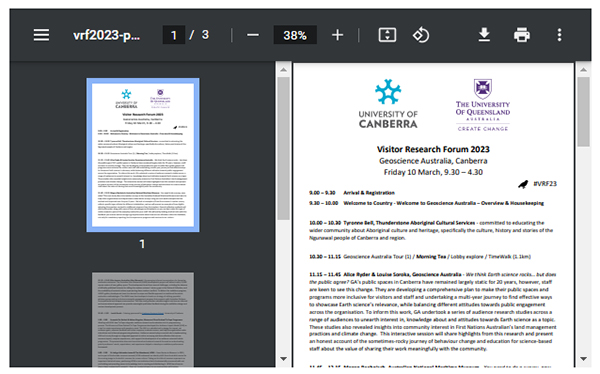Visitor Research Forum 2023: Friday 10 March #VRF23, Museums/Digital/Research/Learning, 23 February 2023
We now have a final program for the 2023 VRF and it’s a cracker! The VRF is free to attend, both in-person and online.
BOOK HERE for the 2023 VRF.
The VRF will start with a Welcome to Country from Tyrone Bell, Thunderstone Aboriginal Cultural Services, and a tour of Geoscience Australia or you can take a walk through Earth’s history on GA’s TimeWalk, in the grounds of the building.
Then, we get into sessions, summarised below.
We think Earth science rocks … but does the public agree? Alison Ryder and Louise Soroka, Geoscience Australia
GA is developing a comprehensive plan to make public spaces and programs more inclusive for visitors and staff, informed by a series of audience research studies which will be presented in an interactive session with an honest account of the sometimes-rocky journey of behaviour change and education for science-based staff about the value of sharing their work meaningfully with the community
You need to do a survey, now what? Megan Baehnisch, Australian National Maritime Museum @MeganBaehnisch
This case study dives into teacher surveys at the ANMM to help other organisations and departments make better surveys using our real-world example that has evolved and improved over the past three years.
Encouraging informal conversations for formative evaluation outcomes. Bliss Jensen, Australian War Memorial
To deliver the AWM’s ambitious development program, the gallery development team has devised a unique and flexible approach to traditional formative evaluation methodologies. This case study will provide valuable insights into how an informal and conversational approach can provide meaningful qualitative feedback during the exhibition design and content development process.
Working with AIM: how Te Papa integrates audience research and evaluation into its programming process. Samuele De Stefani and Adrian Kingston, Museum of New Zealand Te Papa Tongarewa @adriankingston
The Museum of New Zealand Te Papa Tongarewa developed the Audience Impact Model (AIM) as a tool to create experiences with people in mind, with audience research playing a central role. Our presentation discusses how internal and external research focused on understanding priority audiences’ needs, expectations, and experiences helped us develop an ambitious performance framework.
From Centre to Museum. Dr Indigo Holcombe-James and Tim Woodward, ACMI @Indigo_H_J
In 2021, and as part of the broader museum renewal, ACMI underwent an identity shift: from Australia’s centre for the moving image to Australia’s museum for screen culture. Drawing on our learnings to date, this presentation offers an overview of our current practice of visitor research, sets out our thinking about what it means to conduct visitor research on and within a multiplatform museum, and our future plans for doing so.
The impact of the BCE system as a latent marketing tool. José Robertson, Book Canberra Excursions and Garry Watson, NCETP
The Book Canberra Excursions (BCE) system enables tour operators, schools and social groups to easily book into National Attractions prior to visiting Canberra and the surrounding region. This presentation will outline the BCE system’s uses and capabilities.
Visitors, Big Issues. Where does GLAM fit? Dr Lynda Kelly, LyndaKellyNetworks / Chair, EVRNN @lyndakelly61
As GLAM institutions continue dialogues around big, complex and challenging issues impacting our sector and our world, what do visitors think the role GLAM should play in these conversations? How are we acknowledging and including visitors’ voices within our institutional practices? This paper will present research gathered over the past four years across a wide range of audiences that unpacked these questions and big issues.
Lessons learned from pilot testing a Revised DoVE (Dimensions of Visitor Experience) checklist. Dr Jan Packer, University of Queensland
Between 2020 and 2022, we revised the DoVE checklist based on user feedback and rigorous pilot testing at six institutions in USA and Australia. This presentation will discuss the instrument’s reliability, validity and susceptibility to response bias and outline DoVE version 2.
Download the full program here:

The 2023 VRF is supported by the University of Canberra, and University of Queensland, as well as the Evaluation and Visitor Research National Network of AMaGA. The venue and tours have been generously provided Geoscience Australia and catering by Canberra Business School.
Hope to see you there! You can also follow along on Twitter with the hashtag #VRF23.
